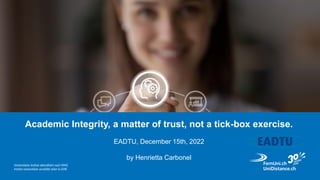
Academic Integrity as a matter of trust, not a tick-box exercise - Henrietta Carbonel
- 1. 1 Academic Integrity, a matter of trust, not a tick-box exercise. EADTU, December 15th, 2022 by Henrietta Carbonel
- 2. 2 Academic integrity => Trust https://www.theguardian.com/world/2021/jan/09/aust rian-minister-resigns-amid-plagiarism-scandal https://www.politico.eu/article/surgisphere-scandal-shows-perils-of-mixing-big-data-and-scientific-research/
- 3. 3 Online proctoring, a contested solution. Issues with online proctoring: ▪ Algorithmic biases (colour, gender, health, family, etc.) ▪ « the means we use contribute qualitatively to the very character of the goals which they produce » Carr, 1992 ▪ Acceptance or critical approach to the surveillance society ▪ ‘On the Efficacy of Online Proctoring using Proctorio,’ Bergmans et al. 2021 “Invigilation, and other measures to prevent cheating, start from a default position of lack of trust in students. Their use erodes the potential for building trusting relationships between students and staff.” (Ross and Macleod, 2018)
- 4. 4 Students Institution Employers Government Accreditation Agencies Teachers Technology Trust Trust and assessment, a multi-layered issue. • The institution and accreditation agency that their degree is valuable. • Their teachers and peers (to interact, take risks, be open to feedback). • The technology and processes. • Works • Data privacy • Usage as a student / researcher • Students’ own work
- 5. 5 Work in progress: What could trustworthy remote exams look like in the (distance) university of the future? Photo by C Carbonel Speculative design thinking approach: • Open the field of possibles • Critically discuss the implications of these possible futures • Values based Ross, J. (2023). Digital futures for learning: Speculative methods and pedagogies. Routledge. Law, J. (2004). After Method: Mess in Social Science Research. Routledge. https://doi.org/10.4324/9780203481141
- 6. 6
- 7. 7 Resources ▪ EDUDL+ resources: https://unidistance.ch/en/edudl-resources ▪ Bergmans, L., Bouali, N., Luttikhuis, M., & Rensink, A. (2021). On the Efficacy of Online Proctoring using Proctorio: Proceedings of the 13th International Conference on Computer Supported Education, 279–290. https://doi.org/10.5220/0010399602790290 ▪ Biesta, G. (2007). Why ‘What Works’ Won’t Work: Evidence-Based Practice and the Democratic Deficit in Educational Research. Educational Theory, 57(1), 1–22. http://dx.doi.org.ezproxy.is.ed.ac.uk/10.1111/j.1741-5446.2006.00241.x ▪ Boud, D. (2000). Sustainable Assessment: Rethinking assessment for the learning society. Studies in Continuing Education, 22(2), 151–167. https://doi.org/10.1080/713695728 ▪ Boud, D., & Bearman, M. (2022). The assessment challenge of social and collaborative learning in higher education. Educational Philosophy and Theory, 1–10. https://doi.org/10.1080/00131857.2022.2114346 ▪ Carless, D., Joughin, G., & Liu, N.-F. (2006). How Assessment Supports Learning: Learning-Oriented Assessment in Action. Hong Kong University Press. http://ebookcentral.proquest.com/lib/ed/detail.action?docID=677207 ▪ Carr, D. (1992). Practical Enquiry, Values and the Problem of Educational Theory. Oxford Review of Education, 18(3), 241–251. ▪ Fawns, T. (2019). Postdigital Education in Design and Practice. Postdigital Science and Education, 1(1), 132–145. https://doi.org/10.1007/s42438-018-0021-8 ▪ Ross, J., & Macleod, H. (2018). Surveillance, (dis)trust and teaching with plagiarism detection technology. Networked Learning, 8. ▪ Rossade, K.-D., Janssen, J., Wood, C., & Ubachs, G. (2022). Designing Online Assessment. Solutions that are Rigorous, Trusted, Flexible and Scalable. Zenodo. https://doi.org/10.5281/zenodo.6563226
- 8. 8 Danke für die Aufmerksamkeit! Merci pour votre attention ! Thank you for your attention!
